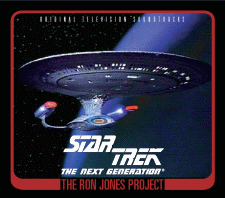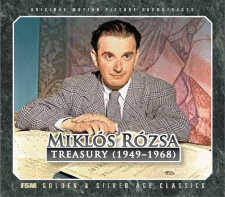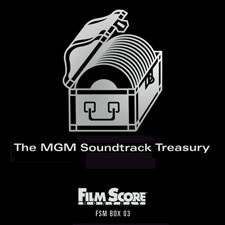Star Trek: The Next Generation
The Ron Jones Project
This box set presents a comprehensive collection of Ron Jones’s music from Star Trek: The Next Generation, composed for 42 episodes during the show’s first four seasons (1987–1991). The complete scores (in stereo) to 40 of these episodes appear on discs 1–12, followed by bonus tracks from the two-part “The Best of Both Worlds” (most of which is already available on CD from GNP/Crescendo). Disc 13 features alternate and outtake cues, and disc 14 presents Jones’s scores to the Interplay computer games Starfleet Academy (1997) and Starfleet Command (1999). The first-season score “Heart of Glory,” 15 minutes of which was included on GNP/Crescendo’s The Best of Star Trek: 30th Anniversary Special (GNPD 8053), is included on disc 3 in complete form.
This release represents one of the largest single collections of a film composer’s work, and a groundbreaking achievement in the history of Star Trek. Fans who know Jones’s music—and it was hard to watch Star Trek: The Next Generation without appreciating his efforts—will be champing at the bit to hear these gems at long last.
For the uninitiated: Ron Jones may not be a familiar name like John Williams, Jerry Goldsmith or Bernard Herrmann, but he poured his heart and soul into The Next Generation in the best tradition of those giants. He labored to come up with just the right melody and orchestration for each episode. Listen to the sound clips and read the program commentary on this Web site and you will discover an artist who believes in the power of music and in forging new ground in the best tradition of Star Trek. FSM would not be releasing 14 discs of his music if we did not believe this was some of the greatest—and most overlooked—scoring not only for television or Star Trek, but for film in general.
The episode scores are newly remastered from the first-generation two-track stereo mixes archived by CBS (on ½″ tape, with program on channels 1 and 2, channel 3 blank and a synch-tone on channel 4). The score for “The Price” (episode #156) could not be located on ½″ tape, so we used Ron Jones’s personal ¼″ stereo tape instead. Some fourth-season scores and the two computer games are mastered from Jones’s first-generation stereo DATs.
This box set is available from Film Score Monthly’s retail partner, Screen Archives Entertainment, for $149.95. Only 5,000 copies are being produced. The 14 discs come in three “butterfly” cases, packaged in a hard slipcase with an illustrated 60-page booklet containing track listings and an introductory essay. Space limitations and cost prevented the booklet from including comprehensive essays on each individual score—so that commentary is available here on FSM’s Web site, free of charge. In new interviews conducted expressly for this release, Ron Jones adds his thoughts on each score. For ease of printing, these online notes are also available in convenient PDF form (494K).
Foreword
The 1987 launch of Star Trek: The Next Generation was one of the most daring experiments in the history of television. TV series had been revived in one form or another before, but never one with the history and fan base of Star Trek (1966–1969). Gene Roddenberry and Paramount had come close to resurrecting the series in the 1970s with Star Trek Phase II, designed to launch a new Paramount television network, but that concept morphed into Star Trek: The Motion Picture (1979) and a successful theatrical film franchise. The box-office clout of Star Trek IV: The Voyage Home (1986) helped pave the way for a new television series that Gene Roddenberry designed to take place well after the events of the original Star Trek.
From its inception, Star Trek: The Next Generation faced the challenge of pleasing both fans of the original television series and a new audience of television viewers. Roddenberry’s conception for the series was highly pacifistic, decreeing that there not be character conflicts among the crew of the new U.S.S. Enterprise, the NCC-1701-D. He placed a teenaged character (as well as families of crewmembers) aboard the ship, and declined to reprise the original series’ characters or villains. A lone Klingon, the Federation’s old enemy, was instead an ally on the bridge, and a bald, middle-aged captain—Jean-Luc Picard (Patrick Stewart)—sat in the command chair.
Clearly this was a radically new series, unlike the ’60s Star Trek in many respects. Paramount sold the show directly to syndication, giving Roddenberry and company more control over its creative content. But its “shakedown cruise” lasted for the first two seasons as the series often struggled to find a tone, shifting between adult themes and juvenilia. Nonetheless, during those first years many of the program’s core themes and characters were developed, and the series boasted strong ratings and began to generate a devoted fan base. By its third and fourth seasons, it was a phenomenon in its own right, with a new legion of devoted Star Trek watchers.
From the very first episodes of the show, one of the most consistent and ambitious behind-the-scenes talents was composer Ron Jones. Although he did not score the series pilot, “Encounter at Farpoint” (that was handled by Dennis McCarthy), due to post-production scheduling Jones was the first composer to go onto the recording stage—to score the first weekly episode, “The Naked Now.” The story was a sequel and in many ways a remake of an early episode of the original series, “The Naked Time.” The look of the show’s sets and visual effects had been largely inherited from the Star Trek movies, yet the story clearly called for an acknowledgement of the original ’60s television series. Additionally and crucially, the decision had been made that the main title music for Star Trek: The Next Generation would reprise Jerry Goldsmith’s popular theme from Star Trek: The Motion Picture. Add to that the fact that syndicated repeats of the original series had drummed the show’s music scores and themes into the heads of fans for over 20 years, and the challenge Jones faced becomes clear: Somehow he had to acknowledge both the Star Trek feature-film aesthetic and the bold, distinctive approach of the original series—yet bring both sensibilities forward to a modern era for contemporary audiences, and on a weekly television budget.
Jones succeeded, melding symphonic orchestration, echoes of the original television series music (especially Alexander Courage’s “Theme From Star Trek,” also used in TNG’s opening credits), and an array of synthesizer tones to give the music a more futuristic quality. Jones typically alternated episodes with Dennis McCarthy, scoring nearly half of them during seasons one through four. Throughout, Jones sought to give each episode a distinctive sound and often a highly intellectual approach, while carrying forward and developing themes for the Enterprise as well as the show’s signature alien races: the Klingons, the Romulans and the Borg. In the first two seasons, Jones’s music provided the show a consistency and dramatic grounding that its storylines sometimes struggled to achieve, while in seasons three and four his scores became more internal and psychological, befitting the series’ burgeoning maturity. But when the show needed symphonic scoring in the grand “space opera” tradition, Jones rose to the occasion: his epic score to the series’ first cliffhanger and resolution, “The Best of Both Worlds,” helped kicked TNG’s popularity into the stratosphere.
Ron Jones’s Star Trek musical universe is a remarkably fleshed-out world unto itself, with electronic music that is hypnotic, disturbing and sometimes wistfully touching; action music that is always martial and thrilling; and some wonderfully daring and evocative approaches to individual episodes, from the Celtic jigs of “Up the Long Ladder” to the alien-orchestra mentality of “First Contact.” Almost as fascinating as Jones’s music itself is the man’s perspective on the series and his work, his often symbolic approach to the show’s science fiction and cultural concepts, and his sense of humor, metaphor and irony, all of which you will experience in his comments on his individual episode scores.




